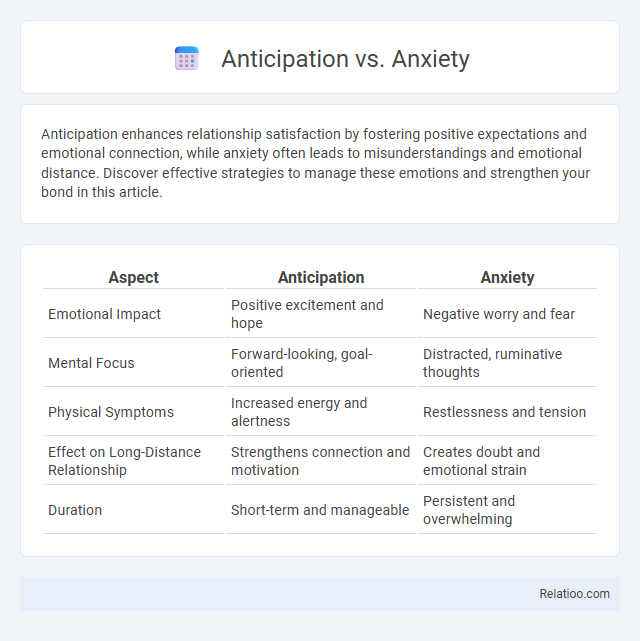Anticipation enhances relationship satisfaction by fostering positive expectations and emotional connection, while anxiety often leads to misunderstandings and emotional distance. Discover effective strategies to manage these emotions and strengthen your bond in this article.
Table of Comparison
| Aspect | Anticipation | Anxiety |
|---|---|---|
| Emotional Impact | Positive excitement and hope | Negative worry and fear |
| Mental Focus | Forward-looking, goal-oriented | Distracted, ruminative thoughts |
| Physical Symptoms | Increased energy and alertness | Restlessness and tension |
| Effect on Long-Distance Relationship | Strengthens connection and motivation | Creates doubt and emotional strain |
| Duration | Short-term and manageable | Persistent and overwhelming |
Understanding Anticipation and Anxiety
Anticipation is a mental state characterized by positive expectation and excitement for a future event, often enhancing motivation and focus. Anxiety involves feelings of worry, nervousness, or fear related to uncertain outcomes, frequently triggering physiological stress responses. Understanding the distinct emotional and cognitive processes behind anticipation and anxiety helps in managing reactions to upcoming situations effectively.
The Psychological Roots of Anticipation
Anticipation stems from the brain's ability to predict future events based on past experiences, activating neural pathways associated with reward and motivation. Anxiety is linked to the amygdala's heightened response to perceived threats, triggering stress and fear even when the outcome is uncertain. Your capacity to anticipate positively depends on a balanced cognitive appraisal that differentiates hopeful expectation from fear-driven worry, rooted deeply in psychological conditioning and emotional regulation.
How Anxiety Manifests in Daily Life
Anxiety manifests in daily life through physical symptoms such as increased heart rate, sweating, and muscle tension, often triggered by perceived threats or stressors. You may experience persistent worry, restlessness, and difficulty concentrating, which interfere with routine activities and decision-making. Recognizing these signs early helps differentiate anxiety from healthy anticipation, enabling better management and improved mental well-being.
Key Differences Between Anticipation and Anxiety
Anticipation is a positive emotional state characterized by excitement and eager expectation of a future event, often linked to hopeful outcomes and motivation. Anxiety involves a negative emotional response marked by worry, fear, and uncertainty about potential threats or adverse events, triggering stress or avoidance behaviors. Key differences between anticipation and anxiety lie in their emotional valence--anticipation promotes proactive engagement, whereas anxiety tends to cause hesitation and physiological distress.
The Role of the Brain in Both Emotions
The brain's limbic system, particularly the amygdala, plays a crucial role in both anticipation and anxiety by processing emotional responses and threat detection. While anticipation activates the prefrontal cortex to generate positive expectations and goal-oriented motivation, anxiety triggers heightened amygdala activity leading to fear and worry about uncertain outcomes. Neurotransmitters like serotonin and dopamine differentially influence these states, with dopamine promoting anticipation's reward pathways and serotonin modulating anxiety-related stress responses.
Positive and Negative Effects on Decision-Making
Anticipation can enhance your decision-making by fostering motivation and preparing you for future outcomes, while anxiety often impairs judgment through fear and stress, leading to indecision or rash choices. Positive anticipation encourages goal-oriented behavior and optimism, whereas negative anticipation, rooted in anxiety, may cause avoidance and reduce cognitive flexibility. Balancing these emotional states is crucial for making informed decisions that align with both your immediate needs and long-term aspirations.
Strategies to Shift from Anxiety to Healthy Anticipation
Transforming anxiety into healthy anticipation involves cognitive reframing techniques that focus on positive outcomes and realistic expectations, reducing the intensity of fear-driven thoughts. Mindfulness practices and controlled breathing exercises help regulate physiological responses, promoting calmness and clarity in moments of heightened emotional arousal. Setting actionable goals and visualizing success enhance motivation, shifting the mental state from immobilizing worry to proactive preparation.
The Impact on Physical Health
Anticipation triggers positive physiological responses such as increased heart rate and adrenaline release, preparing the body for upcoming events and enhancing focus. Anxiety, however, often leads to chronic stress responses including elevated cortisol levels and muscle tension, which can contribute to cardiovascular issues and weakened immune function. Differentiating between healthy anticipation and debilitating anxiety is crucial for managing their respective impacts on physical health and overall well-being.
Mindfulness Techniques for Managing Both States
Mindfulness techniques effectively manage anticipation and anxiety by grounding awareness in the present moment, reducing cognitive overload caused by future-oriented thinking. Practices such as focused breathing, body scans, and mindful meditation help differentiate productive anticipation from debilitating anxiety, promoting emotional regulation and mental clarity. Incorporating mindfulness into daily routines enhances resilience against stress, fostering a balanced mindset amidst uncertainty and expectation.
Building Resilience: Embracing Anticipation Over Anxiety
Building resilience involves shifting your mindset from anxiety to healthy anticipation, allowing you to harness positive energy rather than fear. Anticipation engages your brain's reward system, promoting motivation and proactive planning, while anxiety triggers stress responses that can impair decision-making and well-being. Embracing anticipation enables you to stay focused, adapt to challenges confidently, and maintain mental strength in the face of uncertainty.

Infographic: Anticipation vs Anxiety
 relatioo.com
relatioo.com